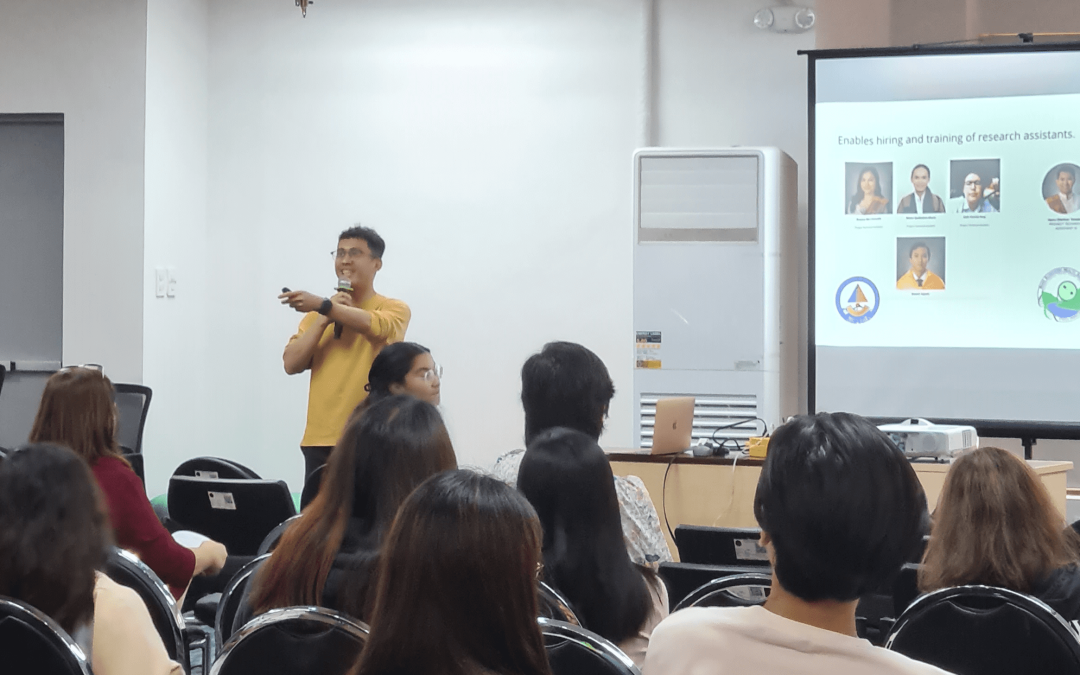Five dynamic speakers inspired the UP Cebu community to reflect, innovate, and strengthen their research and teaching pursuits for the year ahead. From framing compelling research problems and navigating the complexities of literature review, to integrating AI into research design, securing grant funding, and enhancing teaching in diverse classrooms, the forum offered a rich exchange of ideas and practical strategies to enrich academic work across disciplines.
Framing Research Problems
Why Editors Care More About Your Problem Than Your Methods
Dr. Crina E. Tañongon, Ph.D.
Director, Central Visayas Studies Center
Faculty, Communication Program, CCAD
Dr. Tañongon’s lecture emphasizes that framing a research problem is the foundation of any strong scholarly work. A well-framed problem must be clear, focused, and contextualized, specifying who/what, where, when, and why the issue matters. Unlike broad research topics, research problems pinpoint a specific, researchable gap in knowledge that aligns with theory and contributes to scholarly conversations. Editors and reviewers prioritize the problem statement over methodology; a vague or trivial problem often leads to rejection regardless of strong methods. The document distinguishes between topic vs. problem, problem vs. purpose, and problem vs. research question, showing how each must connect tightly. Using examples like Coffee for Peace and agribusiness in Mindanao, Tañongon illustrates how defining problems properly ensures coherence between purpose, framework, and methods. Ultimately, the research problem serves as the “backbone” of the paper, aligning all sections and convincing editors of its value.
The struggle is real:
Sisyphus and myths of RRLing
Asst. Prof. Ma. Theresa Angelina Q. Tabada
Faculty, Communication Program, CCAD
Prof. Tabada’s talk emphasized that doing a Review of Related Literature (RRL) is both a systematic process and an intuitive, reflective journey. She highlighted the need for researchers to understand their positionality, their assumptions about reality, knowledge, and methodology, as these shape how they search, interpret, and present literature. While systematic searching ensures credibility through recent, peer-reviewed sources, an intuitive approach surfaces marginalized voices and alternative knowledge systems often excluded from mainstream academia. Drawing from thinkers like Bourdieu and Spivak, she urged critical awareness of how power influences whose knowledge is valued, reminding researchers that RRL work, though often a Sisyphean task, is vital in questioning and expanding what we know.
Leveraging Gen AI in Academic Research:
Ethics and Responsible Use in Scholarly Work
Dr. Mary Gretchen F. Chaves, DBA
Director, Ugnayan ng Pahinungod Cebu
Faculty, School of Management
Dr. Chaves’ talk on Leveraging Generative AI in Academic Research underscored the transformative potential of AI in enhancing efficiency, idea generation, literature review, and data processing, while stressing the ethical responsibilities that come with its use. It emphasized the importance of human oversight, rigorous verification of AI-generated outputs, and strict adherence to data privacy and confidentiality protocols. She highlighted risks such as plagiarism, bias, hallucinations, and overreliance on AI, advocating for a balanced approach where AI serves as a tool—not a replacement—for human critical thinking and creativity. Central to the message was cultivating a culture of responsible AI use grounded in transparency, fairness, accountability, and continuous AI literacy within the academic community.
From Ideas to Grant:
Strategies for Research Grant Writing
Dr. Brisneve Edullantes, Ph. D.
Faculty, Department of Biology and Environmental Science
Dr. Edullantes’ talk highlighted the vital role of grants in fueling research, advancing careers, fostering institutional growth, and creating societal impact. Drawing from successful project examples, he outlined practical strategies for grant success, including starting early, following guidelines, writing clearly for diverse reviewers, building strong teams, emphasizing significance and innovation, and keeping aims realistic and independent. He stressed the importance of providing preliminary data, detailing a clear and feasible plan, and applying persistently despite rejections. Ultimately, his message underscored that effective grant writing is not just about securing funds, it is about enabling progress and meaningful contributions to society.
Effective Teaching
Asst. Prof. Jeraline E. Gumalal
Faculty, UP Cebu High School
Prof. Gumalal’s presentation on Effective Teaching refers to the result/method which is directly influenced by the teachers’ ability to teach, enable student learning, and achieve specific educational outcomes desired for a specific learning environment and student diversity. She emphasized the importance of obtaining because teachers need to adhere to the academic goals of our university and, of course, keep their teaching position (quite literally).





